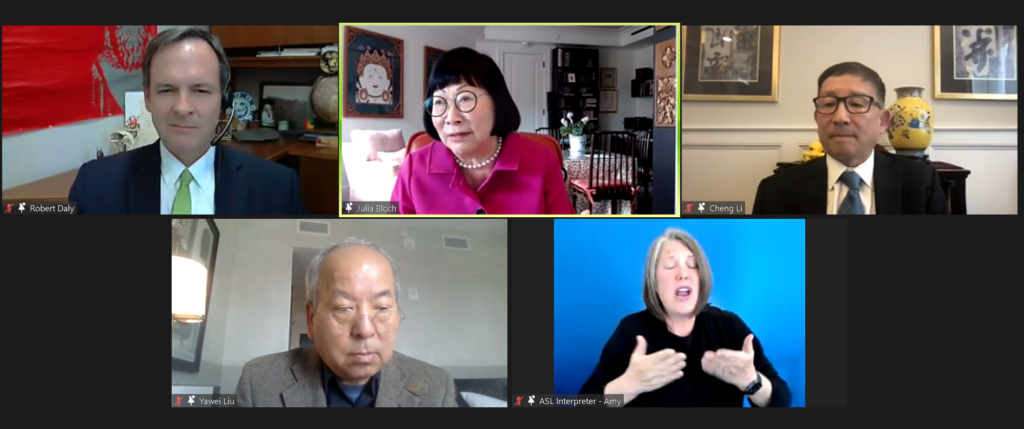
On Thursday, April 21, Ambassador Julia Chang Bloch, USCET Executive Chair, gave a keynote speech at the launch of a new Carter Center report titled Finding Firmer Ground: The Role of Higher Education in U.S.-China Relations. The publication, featuring a collection of essays on the history and current state of US-China educational exchanges, is available from the Carter Center by clicking here. The introduction to the report was authored by Ambassador Bloch.
The April 21 launch event was moderated by Robert Daly, Director of the Wilson Center’s Kissinger Institute on China and the United States, and by Yawei Liu, Senior Advisor on China at the Carter Center. The keynote speakers were Ambassador Bloch and Cheng Li, Director of the John L. Thornton China Center at of Brookings. Yawei Liu opened with brief remarks on the early days of post-Mao US-China relations, and Cheng Li spoke next, outlining the development and benefits of four decades of US-China educational exchanges. While the early exchange of students was viewed as an unalloyed benefit to both societies and a way to promote greater world peace and security, he noted that in the current climate of suspicion about all aspects of US relations with China, some people fear that even education and scientific exchanges may undermine American supremacy and security.
Ambassador Bloch’s talk focused on the costs of “educational decoupling” and the outlook for US-China education relations. She addressed underlying reasons for the ongoing decline of Chinese students to the US and US students to China, as well as the weakening of relationships between educational institutions in the US and China. Ambassador Bloch noted that, even before the pandemic, the rate of Chinese students coming to the US had started to level off and the number of Americans studying in China has declined steadily since 2012. The pandemic has greatly exacerbated these trends. While Chinese students began to return to the US to study in 2021, albeit in smaller numbers than before the pandemic, almost no US students have been able to travel to China to study since the start of the pandemic.
Ambassador Bloch feels that educational decoupling has become real, is two-way, and is more than just a casualty of the pandemic and rising tensions in US-China relations. Ever since the Trump administration launched the China tariffs, there has been much conversation about the economic costs of decoupling. Ambassador Bloch argued that the effects of decoupling will be equally severe in terms of education. Beyond the simple costs to universities in terms of lost students, decoupling the flow of research and ideas will have severe costs in terms of US productivity and innovation as well. In her conclusion, she noted that we must preserve our education connections and normalize US-China education exchanges again as soon as pandemic conditions allow so that it will continue to do what it does best – build mutual understanding between the US and China, and promote peaceful resolution of global problems.
